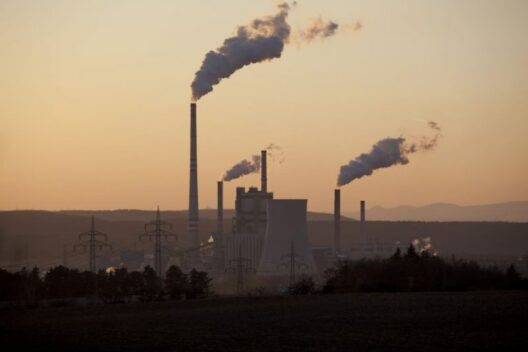In the contemporary era, the perilous phenomenon of global warming looms large, casting a significant ethical shadow. The trajectory of our climate is not merely a scientific quandary; it is a profound moral dilemma that must command our urgent attention. The statistics are alarming: record-high temperatures, melting polar ice caps, and rising sea levels punctuate a calamitous narrative. Yet, amid this disquiet, we must not overlook the multifaceted ethical implications tied to climate change.
To understand the gravity of this situation, one could begin by dissecting the notion of environmental justice. At its core, this concept advocates for equitable distribution of environmental benefits and burdens. For instance, vulnerable populations—often the poorest and least politically powerful—bear the brunt of catastrophic climate events like hurricanes, floods, and droughts. This inequitable distribution necessitates a moral awakening. When wealthy nations, historically the largest polluters, fail to address their emissions while poorer countries face the dire consequences, a moral conflict emerges. Such a disparity highlights the need for a framework that addresses these injustices while demanding accountability from those who contribute the most to the problem.
Furthermore, the ethical implications of climate change extend beyond immediate human welfare. They encompass the broader ecological community, which includes myriad species and ecosystems fundamentally connected to human existence. The Sixth Mass Extinction—a term that resonates with urgency—exemplifies the crisis facing biodiversity today. As human activities wreak havoc on habitats, countless species face extinction primarily due to climate-induced factors. This prompts an ethical inquiry: how do we reconcile our developmental aspirations with the sanctity of life that encompasses all organisms? Can we justify the loss of biodiversity for short-term economic gains?
In navigating these intricate ethical waters, one must reckon with the sociopolitical dimensions of climate change. The discourse surrounding fossil fuel reliance invokes questions of responsibility and collective action. Corporate entities, whose operations contribute significantly to climate degradation, hold a moral obligation to pivot towards sustainable practices. Their pursuit of profit should not eclipse the ethical imperative to preserve the planet for future generations. The transition to renewable energy sources stands as a testament to our capabilities, redirecting our responsibilities toward stewardship rather than exploitation.
The role of individuals, too, cannot be understated in this ethical exploration. Each person possesses the agency to make choices that collectively engender change. However, choices are intertwined with systemic frameworks that can inhibit or facilitate meaningful action. Transitioning to a sustainable lifestyle involves many dimensions—advocating for policy changes, supporting eco-friendly practices, and nurturing a culture that values environmental conservation. This individual activism often merges with collective movements, creating a symbiotic relationship feeding off mutual encouragement and shared goals.
Education serves as a cornerstone of this ethical framework. Informative outreach about global warming’s implications is essential to empower individuals to act. Knowledge dissemination fosters a sense of urgency; it motivates communities to advocate for sound policies and sustainable practices. Establishing a moral climate involves fostering awareness and understanding, which are precursors to galvanizing action. Without this awareness, the moral imperative remains dormant, stymying endeavors for transformative change.
In contemplating a moral climate, one must grapple with philosophical inquiries that challenge conventional thought. The intrinsic value of nature raises pertinent questions about our relationship with the environment. Are we mere occupants of this planet, entitled to exploit its resources, or do we share a profound stewardship responsibility? Our philosophical stance significantly influences the ethical frameworks within which we operate. Therefore, revisiting our foundational beliefs about nature, humanity, and progress is imperative in constructing a moral compass that navigates the tumultuous waters of climate change.
Delving deeper into the ethical implications necessitates an intersectional lens, acknowledging how race, gender, and socioeconomic status intersect within the climate discourse. Climate change exacerbates existing inequalities; thus, the solutions must be inclusive and intersectional. Recognizing that women, particularly in developing nations, often bear the brunt of climate-related stressors reshapes our approach towards advocacy and policy-making. Highlighting these inequalities not only underscores the moral imperative to act but also showcases the necessity for inclusive involvement in climate solutions.
The urgency of addressing global warming is exacerbated by the relentless march of time. As the Intergovernmental Panel on Climate Change (IPCC) warns, our window for action is narrowing. Therefore, a collective moral awakening is needed to spur the requisite policy changes, community action, and individual commitments to sliding away from inertia. This necessitates embracing a culture of accountability—demanding that institutions, corporations, and individuals alike take responsibility for their roles in this unfolding crisis.
In conclusion, the ethical challenges posed by global warming demand an unflinching reckoning. It requires us to consider ecological equity, corporate responsibility, individual agency, and the entangled web of social justice. The moral climate we cultivate today will indubitably shape the legacy we leave for posterity. It is our prerogative—and indeed our duty—to embrace an ethical posture that champions sustainability, advocates for the marginalized, and acknowledges the intrinsic value of our planet’s ecosystems. Only through a united moral front can we hope to confront and mitigate the existential threat of global warming.








